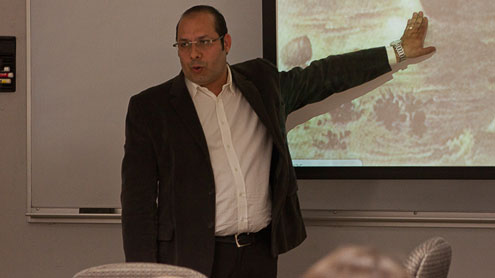In honor of Child Abuse Prevention Month, the University of Alabama’s College of Social Work hosted Brazilian scholar and psychologist Reginaldo Torres Alves Júnior on Wednesday.
Alves, a forensic psychologist for Brazil’s first Child and Juvenile Court of Justice, presented a lecture series about the evolution of child protection in Brazil.
“Our laws are some of the best laws protecting children and children’s rights, but they haven’t always been the best,” Alves said.
He showed images and policies from Brazil’s past that demonstrated how the child protective system had grown, starting with the colonial era. Alves showed that as the policies about slavery changed during this time, so did policies concerning children’s welfare.
In the same way, he explained that during Brazil’s more recent democratic period, civil rights flourished and specific rights for children were adopted.
Debra Nelson-Gardell, a professor and researcher in UA’s College of Social Work, explained what Alves’ contribution meant to the college and her recent work.
“Reginaldo has been working on some similar things, and I realized that working with him would be enriching for both of us” Nelson-Gardell said. “Through our interaction, I’ve gained an appreciation for Brazil’s commitment to listening and its adoption of children’s rights into governmental policies.”
Alves explained that Brazil’s child protective laws have one aim: to listen to children’s needs. He said that this “way of listening” has been in the process throughout the country’s history but has only recently been adopted into Brazil’s Constitution.
Alves also spoke about Brazil’s recent non-governmental measures that aim to connect the families affected by child abuse to the judicial board. The Protective Counsel is one such measure that Alves hopes will benefit children in Brazil.
“Protective Counsel being the voice of the children and families, that is the ideal,” Alves said.
During the presentation, teachers asked questions that compared Brazil’s child protection system with the one present in the U.S. Issues such as community notification for sexual offenders and protective services for victims were discussed.
For some in attendance, the important part was simply increasing global awareness.
“I think it’s important to understand how we’re all connected,” Fay Hobbs, a professor of social work, said. “What goes on in Brazil impacts us here, and what goes on here impacts them. We have more in common than we might think, and we can learn from one another.”









